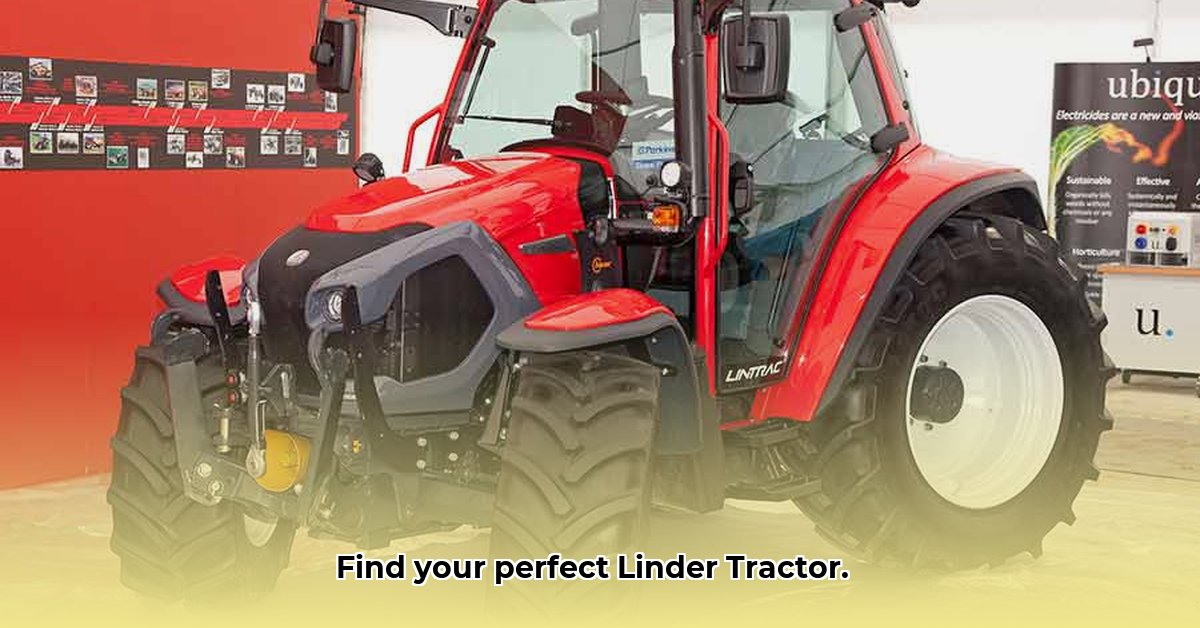
Linder Tractors and the Southeastern US Agricultural Market
Southeastern US agriculture faces unique challenges: hurricane-prone weather, diverse soil types ranging from sandy loam to heavy clay, and a competitive market. This dynamic environment necessitates robust and adaptable equipment. Linder tractors, distributed through both Linder Industrial Machinery and Linder Turf & Tractor, represent a significant player in this landscape. But how do these dealerships and their offerings fit into the larger picture? This guide provides actionable intelligence to help Southeastern farmers navigate the equipment selection process and mitigate potential risks. For additional historical context on farm equipment, check out this resource on older tractor models.
Linder Industrial Machinery vs. Linder Turf & Tractor: A Dealer Comparison
Linder Industrial Machinery operates on a larger scale, offering a wide selection of tractors and equipment from major brands like Kubota and Komatsu. Their broad portfolio caters to large-scale farming operations needing diverse tools. Conversely, Linder Turf & Tractor specializes in niche agricultural solutions, often focusing on smaller farms and particular needs – focusing on personalized service and expert advice. Choosing between these dealers depends on your farm's size, specific needs, and preferred level of personalized support. Do you need a vast selection, or highly personalized service?
Southeastern Farming Challenges and Opportunities
The Southeastern US presents a diverse agricultural landscape. Soil types vary dramatically across the region, influencing the types of crops grown and the equipment required to cultivate them. Moreover, the climate presents significant challenges; hurricanes pose a constant threat, demanding resilient equipment designed to withstand extreme conditions. These variables highlight the need for robust and adaptable tractors, like those offered by Linder. What type of soil dominates your farm? What crops do you primarily grow?
Farmer Testimonials: Linder Tractors in Action
"My Linder tractor has consistently performed under pressure, even during the worst of last year's hurricane season," shares John Miller, a Georgia cotton farmer. "Its reliability is unmatched," adds Sarah Jones, a South Carolina peanut farmer, highlighting the durability essential for this demanding environment. These real-world experiences underscore the value that Linder tractors bring to Southeastern farmers facing a variety of conditions. Have you heard similar testimonials from other farmers in your area?
Choosing Your Linder Tractor: A Practical Guide
Finding the right tractor requires careful consideration. These steps will help you navigate the process:
- Assess Your Needs: Evaluate your farm's size, soil type, crops, and budget. What are your primary needs?
- Research Linder Models: Explore the range of Linder tractors offered by both dealerships, focusing on horsepower, features, and warranty details. What specific features are most important to your operation?
- Visit Dealerships: Speak with representatives at both Linder Industrial Machinery and Linder Turf & Tractor to gain a firsthand understanding of their offerings and compare pricing and financing options. Do they offer any specialized financing options for farmers?
- Test Drive: Test drive potential models under realistic conditions to fully evaluate their handling and operation. What features are most comfortable and effective for your specific farming style?
- Finalize Your Purchase: Once a decision is made, finalize the purchase, ensuring all details regarding financing and maintenance are clearly documented. What is the best financing option for your current needs?
Mitigating Risk in Southeastern Agriculture
Farming in the Southeast involves inherent risks. The following table highlights key risks and mitigation strategies:
| Risk Factor | Mitigation Strategy |
|---|---|
| Hurricane Damage | Comprehensive insurance, robust equipment, and strategic crop planning |
| Soil Variability | Selecting tractors suited for specific soil conditions |
| Economic Downturns | Diversified cropping, efficient farming practices, and financial planning |
| Equipment Malfunctions | Regular maintenance, extended warranties, and strong dealer relationships |
Staying Compliant with Regulations
Compliance with emissions standards and safety regulations is crucial for both farmers and dealerships. Understanding and adhering to these regulations is essential for long-term success. Are there emerging regulations you should be aware of in your area?
Key Takeaways:
- Linder tractors offer a valuable solution for the demanding conditions of Southeastern agriculture.
- Careful consideration of your farm's unique needs is crucial for equipment selection.
- Thorough research involving both dealers and financing options is essential for a successful purchase.
- Risk mitigation strategies, including insurance and financial planning, are indispensable.
- Maintaining compliance with relevant regulations is vital for long-term sustainability.